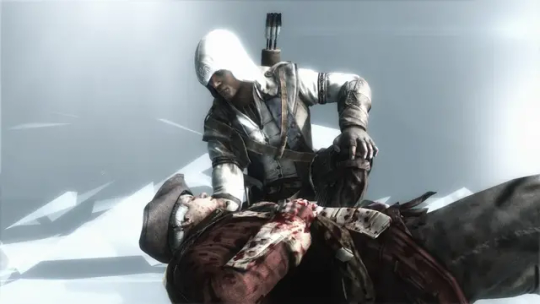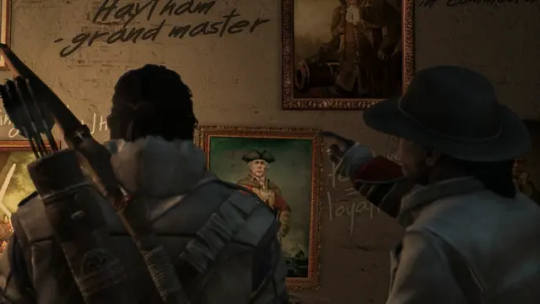Don't wanna be here? Send us removal request.
Text
Some fun before Arcane s2 finale... (or after, depends when u saw this).







16K notes
·
View notes
Text
Ratonhnhaké:ton: Growth and Autonomy

"Connor comes across to me as an incredibly naive character." "People will just tell him someone is a bad guy and he’ll go murder the person, no questions asked. He has almost no autonomy."
While I understand why people within the fandom believe this, these interpretations only overlook critical aspects of Connor’s character. His perceived naivety is not a flaw—it’s an intentional feature of his narrative. Connor begins the story as a young man thrust into a complex, unfamiliar world filled with conflicting beliefs and customs. His arc centers on navigating this chaos and growing into someone who balances idealism with hard-earned wisdom. Far from being a passive or blindly obedient character, Connor demonstrates remarkable autonomy and moral depth throughout his story. Take, for example, his approach to William Johnson. Connor doesn’t immediately kill him when faced with Johnson’s plans to purchase native land. Instead, he undermines Johnson’s efforts through the Boston Tea Party, attempting a peaceful resolution rather than resorting to violence.

Sequence 6: Hostile Negotiations (transcript)
Kanen'tó:kon: William Johnson has returned - with all the money required to buy our land. He meets with the elders as we speak. I have begged them to resist. But I fear he shall have his way unless you intervene. Connor: How is this possible? We destroyed the tea. Achilles: The Templars are nothing if not resourceful. You should have heeded my warning.
Even when circumstances force Connor to kill Johnson, it’s a reluctant act, filled with regret and a deeper understanding of the moral weight of his decision.

Sequence 7: The Midnight Ride (transcript)
Connor: I thought it might bring clarity. Or instill a sense of accomplishment. But all I feel is regret. Achilles: Hold fast to that. Such sacrifices must never come lightly. Connor: I had to do it. Not only for my people, but for all the others Johnson would have harmed.
This is not the behavior of someone who acts without thought or autonomy. Similarly, his handling of Thomas Hickey reflects his nuanced morality; rather than simply assassinating Hickey, Connor attempts to bring him to justice by exposing his counterfeit operation and putting him in jail. This demonstrates Connor’s preference for justice over killing whenever possible—an uncommon trait among Assassins.

Connor’s journey also includes grappling with the conflict between the Assassins and Templars. He openly considers the possibility of peace and collaboration between the two factions, particularly during his time with Haytham. This introspection and willingness to challenge the status quo are unprecedented for an Assassin. No other protagonist in the series has or since entertained the idea of reconciliation with such sincerity and depth.
Sequence 10: Alternate Methods (transcript)
Connor: But now their hold is weakened, which makes me believe there's a chance for peace. Imagine what might be accomplished if we were to unite. Achilles: Why the change of heart? Where is this coming from? You've met your father, haven't you? Connor: I do not claim to trust the man—or even like him. But I would be remiss to ignore this opportunity. Achilles: Haytham may listen. But will he understand? And even if he does, will he agree? Connor: Even he must admit that we achieve more together than we do alone.
His independence is further showcased in his relationship with Achilles. Connor often defies his mentor, such as when he reveals the truth about the Assassins and Templars to George Washington, acting on his convictions rather than blindly following orders.
Even in his most emotionally charged moments, Connor’s actions are driven by a thoughtful moral framework. After discovering Washington’s role in burning his village, Connor doesn’t abandon the Patriot cause out of bitterness. Instead, he chooses to support their fight one last time—not because they are perfect, but because he believes freedom, despite its flaws, is preferable to the Templars' control.

Sequence 10: Broken Trust (transcript)
Connor: You seem to think I favor him. But my enemy is a notion, not a nation. It is wrong to compel obedience—whether to the British Crown or the Templar Cross.
Connor’s story isn’t about blind loyalty or unchecked naivety. It’s about growth, introspection, and the struggle to uphold one’s values in an imperfect world. His choices reflect a level of autonomy and moral complexity that sets him apart, making him one of the most layered characters in the Assassin’s Creed series.
60 notes
·
View notes
Text





/Pinterest/
90 notes
·
View notes
Text

My Darksiders Fics
War/Strife (brothers in arms, not siblings)
Not Alone [M, 14k]
Gone Fishing [M, 7.5k]
Death's Blessing [T, 10.5k]
Fury's Embrace [G, 4k]
Stitching the Wound [T, 3k]
Dueling Grounds [T, 1k]
Teach me how to shoot your gun [M, 1k]
Lanterns [G, drabble]
Headstone [G, drabble]
Gen
About the Brands [T, 2k]
Crowfather [G, drabble]
Darksiders Meta
Darksiders Timeline
The Tale of the Door to the Well of Souls
The Seven Seals on the Armageddon Blade
Horsemen are brothers in arms, not siblings
Darksiders Music
Piano cover for Genesis main theme
More about the Genesis main theme
Darksiders Gifsets
War
Strife
War
16 notes
·
View notes










